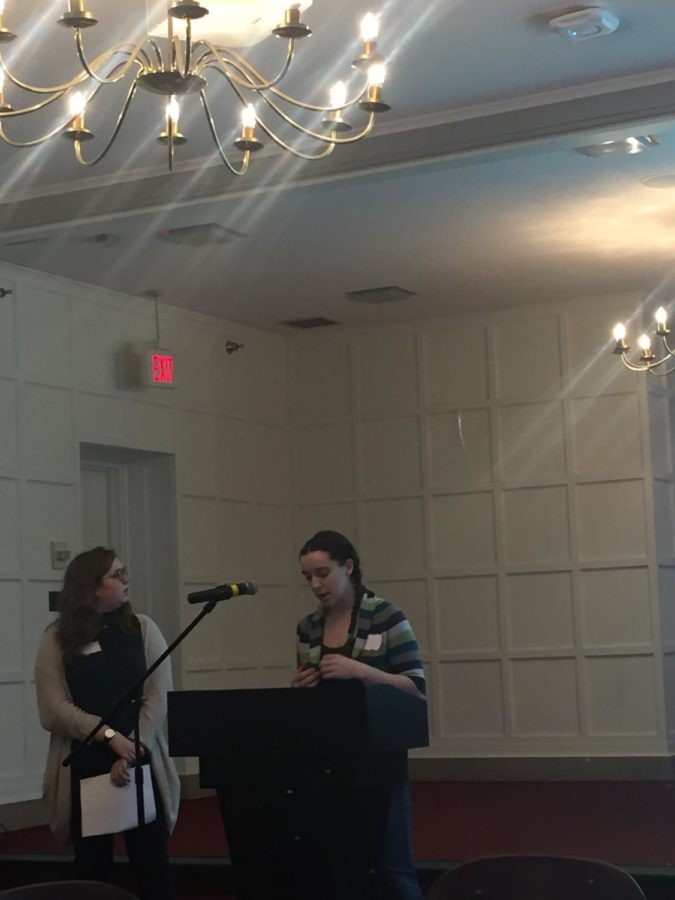Through two presentations, gender, sexuality and leadership all have a connection
April 7, 2018
Moderated by Leah Allen, an assistant professor in gender, women’s and sexuality studies and English at Grinnell College, gender, sexuality and leadership was the core of a discussion in a session in the Cardinal Room of the Memorial Union.
The first presentation given was by Jennifer Frank, senior in software engineering. As a woman in the field of engineering, Frank said that she has experienced discrimination in the workplace.
The mistreatment made Frank have a desire to look more into the topic.
The research that Frank looked into focused on how women and what type of leaders women could be in the field of Engineering.
“[The] research also drives into the thought process of the hiring process of hiring women over men and looking at gender organizations,” Frank said. “However wherever I tried to overlap between women and engineering and women in leadership, I fell short.”
With the lack of research Frank was unable to find, she said it helped her want to study the benefits of having women at leadership roles in Engineering organization in the United States.
In the midst of Frank’s research, she was able to see four distinctive leadership skills that women have that are beneficial to leadership in Engineering.
The four skills were their collaborative, investment in team members as individuals, adaptability and acceptance to change.
“Those in the studies tend to describe themselves as quality listeners and those who worked with women said that the women’s ability to collaborate made them some effective leaders.” Frank said about her findings.
Frank mentioned the word transparency throughout her findings, and that it is a very important skill that women leaders possess.
“Women tend to be more vulnerable than men and want that transparency,” Frank said.
Two participants in the study Frank discussed said under the leadership of a woman, the members of the group have strong communication skills.
Participants in the study stressed the importance of communication and as an engineering student, Frank said that it is strongly emphasized through her classes at Iowa State by her professors.
A male participant referred to women leaders as natural change agents because of their adaptability and they are able to evolve their leadership skills to what is needed. Frank said the participant said women leaders are more able to do this than men leaders.
“Leaders are needed to be open to change not only to be effective but also to be innovative,” Frank said.
Frank said there are stereotypes within the hiring process that hinder women from the leadership opportunities. She also said many engineering organizations want to diversify their companies, but are not aware of the benefits of diversifying the companies.
“Engineering companies that have more seminars, lectures and conversations about gender intelligence tend to perform significantly better as an organization,” Frank said. “We also need to foster women at a young age so they can be aware of these engineering leadership opportunities and inspire them to have them one day.”
Greek Membership and Gender Roles
The idea for the study came about in the Women’s Studies 402 class. In the class, the students learn to conduct feminist research through CITI Human Research Training, explained by students Morgan Jensen, senior in political science, Logan Yerrid, freshman in Women’s Studies, and Laurie Johnson, senior in History.
The students had only six weeks to complete the survey, and as of now, they are still in process.
They explained how they had a set back and were given a late approval to do the research within the Greek community.
The group is to send out a survey for sorority members of the National Pan-Hellenic Council, Multicultural Greek Council and Collegiate Panhellenic Council and then select individuals who filled out the form to conduct one-on-one interviews.
By looking at socialization within sororities doing activities such as bonding, chapter rituals and solidarity and also looking at attitudes on dress codes, standards and expectations the group believes that they will how do the greek chapters play a role in value transmissions and provide cues for gender norms.
During the one-on-one interviews, the group mates hope to expand on the answers that sorority members answered in the online surveys. They plan to ask questions on relationship with their fellow sorors, their experiences within the chapter and to see how different chapters function.
“When it comes to greek life, we hear a lot of bad things, not a lot of good things,” Yerrid said.
Jensen said that she would like to see sororities become more inclusive for everyone, not just people who fit the stereotypes and for everyone to feel that they can be apart of Greek life.
The group said that if they had more time, they would like to expand and see how femininity and masculinity impact both fraternities and sororities and also look at LBGTQIA+ inclusive sororities as well.
Both groups realized through audience members pointing it out and by listening to both presentations that hegemonic femininity plays a role in both subjects.
Hegemonic femininity is the idea of a certain womanhood and all other roles of femininity are subordinate to ideal female under the category. It is something that is held up and culturally expected for all women to fulfill the role.
A few audience members felt they were able to detect it through Frank’s research, reevaluating traits that are considered feminine and actually starting to use them for good quality leadership skills and then for Jensen, Yerrid and Johnson, it would apply to their upcoming research to look at what are the traits and stereotypes and how they can be changed to include those that were excluded.
“You both really should look at each other’s work,” one attendee told the two groups.







